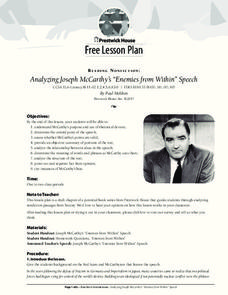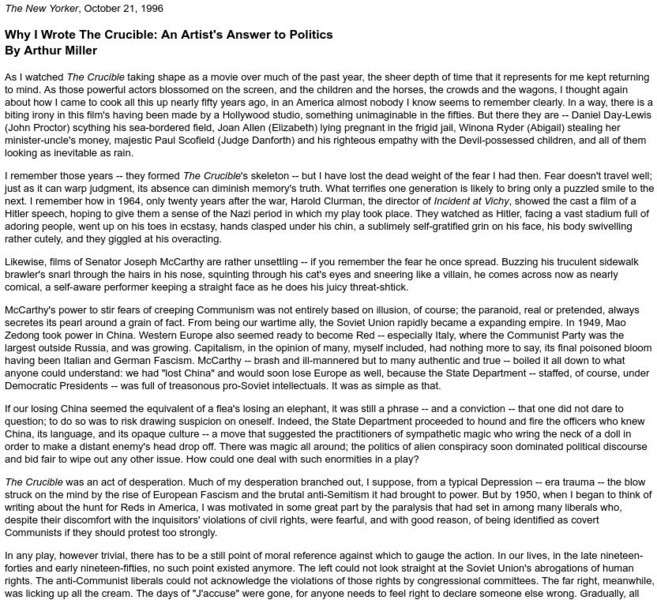Curated OER
The Crucible by Arthur Miller
Examine the life of Arthur Miller and the characters in one of his well-known plays, The Crucible. The first few slides give background information on Miller as well as Senator McCarthy and the blacklisted celebrities during the...
Curated OER
The Crucible
Display information regarding Arthur Miller and some of his well-known plays. The majority of these slides give facts, biographical, and historical information; only one slide lists information on the Salem witch trials as they pertain...
Curated OER
The Crucible by Arthur Miller
Begin reading The Crucible and form a foundation for your study with this presentation. Arthur Miller and the historical background of McCarthyism are covered at the beginning, followed by short descriptions of all the characters in...
Penguin Books
A Teacher's Guide to the Signet Classic Edition of The Crucible by Arthur Miller
A 20-page guide is a must-have for any instructor, seasoned veteran, or first year-teacher, using Arthur Miller's The Crucible as an anchor text. The guide begins with extensive background information about Miller and the McCarthy era...
Curated OER
The Breaking of Charity
The danger of mob mentality is on display in The Crucible by Arthur Miller. Get your class thinking with some challenging quickwrite questions, then assign characters from the play to be read aloud altogether. Links to worksheets...
Curated OER
Salem Witch Trials
Students consider the implications of the Salem Witch Trials. In this literature lesson, students read Arthur Miller's The Crucible and compare the witch trials to McCarthyism of the 1950's. Students rewrite scenes from the play...
Curated OER
Kazan, Miller, and the McCarthy Era
Students read The Crucible in order to investigate the McCarthy era and the Hollywood Blacklist. Students watch video clips of the McCarthy witch hunts and investigate the time period through online research. Students recreate sections...
Curated OER
Crucible Test
In this literature analysis activity, students write a paragraph using quotes and specific examples as an essay test of The Crucible.
Annenberg Foundation
Becoming Visible
The television and interstate highways both came of age in 1950s America. Scholars use film, text, and discussion to explore how these and other cultural icons shaped the literature of the time. Pupils also create a family history...
Prestwick House
Reading Nonfiction: Analyzing Joseph McCarthy's "Enemies from Within" Speech
Looking for a lesson that teaches class members how to analyze nonfiction? Use Joseph McCarthy's famous "Enemies from Within" speech as a instructional text. Worksheet questions direct readers' attention to the many historical...
Georgia Department of Education
Ga Virtual Learning: American Literature: The Crucible
This is the introduction to an American Literature unit on The Crucible by Arthur Miller. Miller wrote the play about the witch hunt in the 1690s in Salem, Massachusetts as an allegory protesting against McCarthyism, a similiar problem...
Georgia Department of Education
Ga Virtual Learning: American Literature: The Crucible: Research Assignment
This lesson focuses on a pre-reading research assigment providing background for The Crucible by Arthur Miller. It features a list of topics and questions under each topic. It results in a presentation using Glogster, Prezi, or PowerPoint.
CommonLit
Common Lit: Book Pairings: "The Crucible" by Arthur Miller
In +J1105:J1113this allegorical drama, inspired by the witch hunt trials of 1692-93 and the 1950s Red Scare, the town of Salem is plagued by hysteria and accusations of witchcraft. Selected (9) reading passages (grades 8-12) to pair with...
Other
Why I Wrote the Crucible, by Arthur Miller
Arthur Miller's reflections on why he wrote the play The Crucible while working on the film adaptation (1996). He discusses McCarthyism as well as the process of writing and staging the play.
University of Pennsylvania
Univ. Of Penn: Hysteria and Ideology in "The Crucible"
This website, which is provided for by the University of Pennsylvania, reproduces an article by Richard Hayes from "Commonweal" in 1953. A good opportunity to see a review of "The Crucible" from the time the play originally appeared.
















